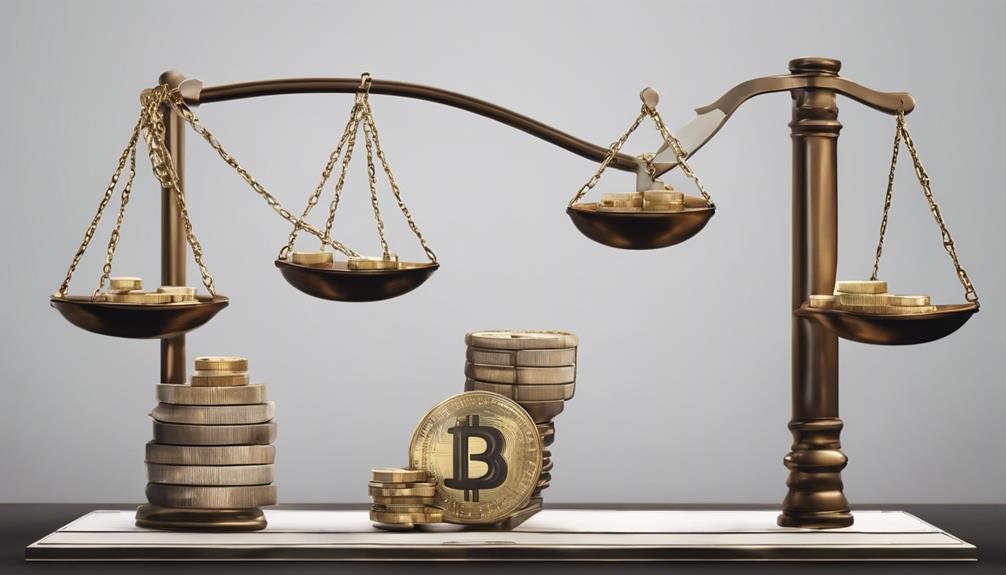Traversing DeFi’s regulatory landscape faces hurdles like jurisdictional ambiguity, compliance complexities, and security vulnerabilities. The decentralized nature of DeFi challenges traditional oversight methods, hindering the establishment of clear regulatory frameworks. Balancing innovation with investor protection poses a significant challenge, requiring regulators to adapt swiftly to address the dynamic environment. Security risks, intelligent contract vulnerabilities, and the absence of centralized control complicate regulatory oversight. Understanding these seven key hurdles in regulating DeFi platforms is pivotal for policymakers and stakeholders alike in traversing this evolving space.
Brief Overview of Key Hurdles in Regulating DeFi Platforms
- Regulatory uncertainty due to its decentralized nature complicates oversight.
- Jurisdictional ambiguity challenges defining authority over DeFi entities.
- Cross-border compliance issues arise from a need for more centralized control.
- An ambiguous legal framework hampers regulatory responsibilities.
- Balancing innovation and investor protection presents unique challenges.
Regulatory Uncertainty in DeFi Space
Traversing the regulatory landscape of decentralized finance (DeFi) proves challenging due to the inherent decentralized nature and absence of centralized governing bodies. Regulatory uncertainty looms large in the DeFi space, posing significant hurdles for traditional regulatory frameworks. The decentralized nature of DeFi platforms complicates the identification of entities offering services within these protocols, making it arduous for regulators to ensure compliance. Additionally, the lack of centralized control in DeFi platforms limits the jurisdictional reach of legal regimes, further exacerbating regulatory challenges.
The evolving DeFi ecosystem has left regulators worldwide grappling with how to address these regulatory uncertainties effectively. The absence of clear guidelines on licensing obligations and regulatory oversight for DeFi platforms has led to adaptation struggles in the regulatory space. With a consensus on navigating these challenges, regulators can avoid facing an uphill battle in enforcing regulatory measures within the decentralized world of DeFi, contributing to the prevailing regulatory uncertainty in this space.
Compliance Challenges for DeFi Platforms

Traversing the regulatory landscape of decentralized finance (DeFi) presents a formidable challenge for platforms as they grapple with compliance hurdles<span data-preserver-spaces=”true”> stemming from the absence of centralized entities overseeing regulatory adherence. The decentralized nature of DeFi platforms makes it challenging to implement traditional regulatory frameworks, especially concerning financial compliance like Anti-Money Laundering (AML) and Countering the Financing of Terrorism (CFT) obligations.
Additionally, the self-governing aspect of DeFi protocols adds another layer of complexity in identifying and regulating entities providing financial services within these platforms. As DeFi platforms operate globally, the jurisdictional reach and enforcement of compliance standards become intricate, further complicating regulatory oversight. The need for clarity on addressing compliance challenges in decentralized setups hinders effective regulation of DeFi platforms, highlighting the pressing need for innovative solutions to guarantee financial integrity within this rapidly evolving sector.
Jurisdictional Ambiguity in DeFi Regulation

The decentralized and global nature of DeFi platforms introduces jurisdictional ambiguity for regulators, leading to challenges in determining the appropriate regulatory boundaries. Cross-border transactions in DeFi further complicate compliance issues, as the lack of centralized governance hinders the application of traditional regulatory frameworks. The ambiguous legal framework surrounding DeFi regulation exacerbates jurisdictional challenges, requiring innovative solutions to address regulatory oversight effectively.
Regulatory Boundary Challenges
Traversing the regulatory landscape of decentralized finance (DeFi) presents a formidable challenge due to the jurisdictional ambiguity stemming from the global operations of these platforms. Regulators struggle to define the boundaries of their authority over decentralized entities that transcend traditional borders.
The lack of centralized entities in DeFi complicates regulatory oversight and enforcement efforts across different jurisdictions. Jurisdictional disputes may arise due to DeFi’s decentralized nature, which makes it difficult to establish clear regulatory boundaries. The borderless nature of DeFi raises questions about regulatory responsibilities, as traditional frameworks may not quickly adapt to decentralized protocols.
Cross-Border Compliance Issues
Traversing the regulatory landscape of decentralized finance (DeFi) is further complicated by the cross-border compliance issues stemming from the jurisdictional ambiguity that arises due to the decentralized nature of these platforms. DeFi platforms, operating across borders, challenge regulators in determining the appropriate jurisdiction for regulatory oversight.
The lack of a central authority governing these platforms adds complexity, making applying traditional regulatory frameworks universally tricky. Addressing cross-border compliance issues necessitates international cooperation and the harmonization of regulatory standards. The ambiguous jurisdictional boundaries hinder regulatory enforcement efforts and complicate oversight of DeFi activities conducted globally. Resolving these challenges requires a collaborative approach toward establishing effective regulatory mechanisms that transcend geographical limitations.
Ambiguous Legal Framework
Exploring the regulatory landscape of decentralized finance (DeFi) becomes particularly challenging due to the jurisdictional ambiguity stemming from the decentralized and global nature of DeFi platforms. In this scenario, several vital hurdles arise:
- Regulators struggle to determine which jurisdiction has authority over decentralized platforms without central entities.
- The lack of centralized control in DeFi complicates the application of traditional regulatory frameworks across different jurisdictions.
- Determining legal responsibilities and enforcement actions becomes challenging when smart contracts autonomously execute transactions in DeFi.
- The absence of clear jurisdictional boundaries in DeFi regulation hampers efforts to establish consistent and enforceable rules across the industry.
- DeFi protocols and Decentralized Autonomous Organizations further blur the lines between existing financial regulatory requirements, adding to the complexity of the legal and regulatory framework.
Balancing Innovation With Investor Protection

Achieving a harmonious equilibrium between fostering innovation and safeguarding investor interests is a pivotal challenge in regulating DeFi platforms. Decentralized Finance (DeFi) presents unique regulatory issues due to its innovative nature, which offers risks and benefits to the financial systems. Regulators are tasked with evolving their approaches to address these challenges effectively. The dynamic and complex nature of DeFi necessitates swift adaptation to keep pace with technological advancements while ensuring adequate investor protection.
Finding the right balance is essential for regulatory frameworks governing DeFi platforms. Encouraging innovation is vital for the growth and development of decentralized finance, but mitigating risks and protecting investors is equally significant. Regulators must strike a delicate balance to create a conducive environment for innovation while safeguarding the interests of all stakeholders involved. As the DeFi landscape continues to evolve, regulators face the ongoing challenge of balancing innovation with investor protection to guarantee the stability and integrity of the financial system.
Security Risks and Regulatory Oversight

DeFi platforms, plagued by security risks like smart contract vulnerabilities, are susceptible to large-scale breaches such as the 2021 Poly Network hack. Regulatory oversight faces hurdles due to these platforms’ decentralized nature and reliance on smart contracts for autonomous operations. Balancing security measures and compliance in the face of evolving threats remains a critical challenge for both DeFi platforms and regulatory authorities.
Defi Platform Vulnerabilities
Securing DeFi platforms against vulnerabilities remains a critical challenge in the face of potential exploits and regulatory complexities. Smart contract vulnerabilities expose these platforms to security risks, making them susceptible to hacks and financial losses. Regulatory oversight is further complicated by the decentralized nature of DeFi platforms, where traditional enforcement mechanisms need help to maintain control.
The intricate coding of smart contracts leaves room for bugs and errors, creating opportunities for exploitation and manipulation. Without a central authority to monitor and regulate these vulnerabilities, the risk of financial harm to users and investors looms.
- Smart contract vulnerabilities
- Regulatory oversight challenges
- Financial losses for users
- Decentralized nature complexity
- Traditional regulatory enforcement difficulties
Compliance Challenges in Defi
In exploring the terrain of DeFi platforms, the intersection of security risks and regulatory oversight presents a challenging challenge that demands careful consideration and strategic responses. DeFi platforms are susceptible to security risks arising from vulnerabilities in smart contracts, exposing them to potential hacks and financial losses. Regulatory oversight in the DeFi space is intricate due to its decentralized nature, making it arduous for regulators to monitor and guarantee compliance.
Compliance challenges further compound as existing regulations struggle to adapt to decentralized systems, needing more clarity on their applicability. Security risks such as flash loan attacks, rug pulls, and flaws in decentralized autonomous organizations (DAOs) underscore the importance of robust regulatory frameworks. Regulators face the challenge of keeping up with the rapid pace of innovation in DeFi, leading to gaps in oversight that malicious actors could exploit.
Decentralization Vs. Regulatory Control

Managing the intricate balance between fostering decentralization and establishing effective regulatory control presents a formidable challenge in overseeing decentralized finance (DeFi) platforms. This dilemma arises from the unique nature of DeFi platforms operating without central intermediaries, which complicates the application of traditional regulatory frameworks. Key points to keep in mind include:
- DeFi platforms challenge regulatory control due to their decentralized nature.
- Identifying entities for regulatory oversight in decentralized platforms like DeFi is complex.
- Balancing decentralization with effective regulatory measures is vital for DeFi regulation.
- The absence of central intermediaries raises concerns about enforcing accountability.
- Regulators encounter obstacles in adapting existing regulatory frameworks to the decentralized architecture of DeFi platforms.
These factors highlight the intricate interplay between decentralization and regulatory control, underscoring the need for innovative approaches to regulate DeFi platforms effectively.
Evolving Global Regulatory Landscape

The dynamic transformation of the regulatory environment surrounding DeFi platforms reflects a global endeavor to navigate the complexities of overseeing decentralized financial ecosystems. As the crypto space expands, regulators worldwide face the challenge of adapting traditional financial infrastructure to regulate the rapidly evolving domain of Decentralized Finance (DeFi). One of the key hurdles in this evolution is the struggle to identify and regulate entities operating within decentralized protocols, as the decentralized nature of DeFi platforms poses jurisdictional challenges for existing legal regimes.
Regulators are currently emphasizing the classification of digital assets as tradable products rather than directly regulating the underlying network operations of DeFi platforms. This approach highlights the need to bridge the gap between traditional regulatory frameworks and the innovative decentralized technologies that underpin DeFi. The lack of consensus on regulatory approaches further complicates the landscape, necessitating collaborative efforts to develop effective strategies that balance innovation with consumer protection in the domain of DeFi.
Frequently Asked Questions
What Are the Regulatory Challenges of Defi?
Handling regulatory challenges in DeFi involves dealing with regulatory uncertainty, meeting compliance requirements, jurisdictional conflicts, decentralized governance, investor protection, and cross-border transactions. These obstacles necessitate innovative solutions to guarantee effective oversight and legal adherence.
What Are the Barriers to Defi?
Regulatory challenges in DeFi stem from security risks, lack of transparency, compliance issues, smart contract vulnerabilities, regulatory uncertainty, and market manipulation. These barriers hinder effective oversight and raise concerns about investor protection and financial stability.
What Is the Biggest Challenge About Defi?
The biggest challenge about DeFi revolves around security risks, lack of oversight, compliance issues, market manipulation, investor protection, and fraudulent activities. These factors complicate regulatory efforts, necessitating innovative solutions to safeguard users and uphold market integrity.
What Are the Weaknesses of Defi?
DeFi’s weaknesses include security risks from smart contract vulnerabilities, transparency issues due to its decentralized nature, compliance challenges with traditional regulations, governance issues in enforcing rules, liquidity concerns, and market volatility. These factors contribute to the sector’s vulnerability.
Conclusion
In the intricate landscape of overseeing DeFi platforms, maneuvering through regulatory hurdles can be likened to a turbulent sea voyage. The uncharted waters of jurisdictional ambiguity, security risks, and the balancing act between innovation and investor protection present formidable challenges.
As global regulations evolve, finding a harmonious balance between decentralization and regulatory control is pivotal. DeFi platforms must steer their course carefully, adapting to changing tides while ensuring compliance and security for all stakeholders.










